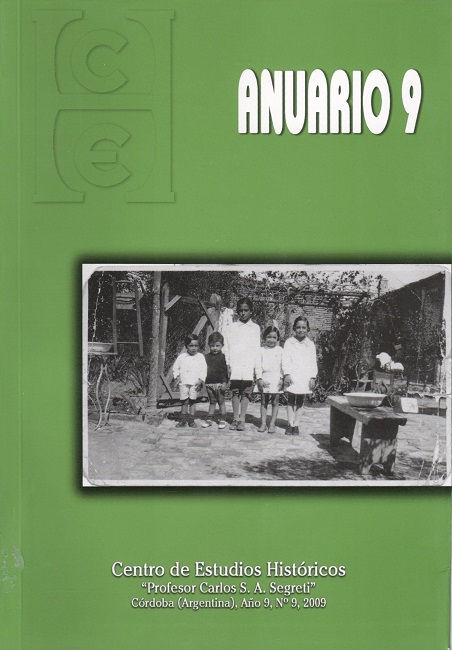At the bottom of the colonial administration: guards and receivers of the Royal Treasury. Salta, XVIII century
DOI:
https://doi.org/10.52885/2683-9164.v0.n9.23178Keywords:
administration, collection, officers, Royal FinanceAbstract
With the present work we face the study of the imperial administrative Spanish organization across the analysis of a sector of the Royal Finance in a peripheral area since it was Salta. The study of punctual sectors of the administration in local spaces like that it us concerns, contributes to a deeper comprehension of the imperial organization and across her of the Ancient Régime in general. We focus our interest in the base structure of the Royal Finance in consideration of which up to the moment there are no studies that realize of this sector, which though it has been forgotten by the historiography, constituted a fundamental gear in the functioning of the fiscal device. Great part of the interest of this work resides in that it enters sectors occupied by persons who did not concern to the elite and on whose shoulders there was relapsing the first link of the fiscal collection.
Downloads
References
ACEVEDO Edberto, La intendencia de Salta del Tucumán en el virreinato de Río de la Plata, Mendoza, Universidad Nacional de Cuyo, 1965.
BARRAL María Elena, “Iglesia, poder y parentesco en el mundo rural colonial. La cofradía de Animas Benditas del Purgatorio, Pilar. 1774”, Cuadernos de Trabajo, Luján, núm. 10, 1998.
BARRAGÁN Rossana, “Españoles patricios y españoles europeos: Conflictos intra-elites e identidades en la ciudad de La Paz en vísperas de la independencia 1770-1809”, WALTER Charles (comp.), Entre la retórica y la insurgencia: Las ideas y los movimientos sociales en los Andes, siglo XVIII, Cusco, Centro de Estudios Regionales Andinos “Bartolomé de las Casas”, 1996.
BONILLA Heraclio, Metáfora y realidad de la independencia en el Perú, Lima, IEP, 2000.
BURKHOLDER Mark, “Burócratas”, HOBERMAN Louisa S. y SOCOLOW Susan M. (comp.), Ciudades y sociedad en Latinoamérica colonial, Buenos Aires, FCE, 1993.
CONTI Viviana, “De las montañas de Santander a los Andes del Sur: migraciones, comercio y elites”, Revista Andes. Antropología e Historia, núm. 8, 1997/8.
GÁLVEZ José F., “Burócratas y militares en el siglo XVIII”, Scarlett O’PHELAN (comp.), El Perú en el Siglo XVIII. La Era borbónica, Lima, Pontificia Universidad Católica del Perú, Instituto Riva Agüero, 1999.
IMÍZCOZ José María (dir.), Elites, poder y red social. Las élites del País Vasco y Navarra en la Edad Moderna, Bilbao, Universidad del País Vasco, 1996.
LYNCH John, Administración colonial española, Buenos Aires, EUDEBA, 1962.
MATA Sara, “Los comerciantes de Salta a fines del siglo XVIII”, Anuario, Rosario, núm. 16, 1993/4.
MATA Sara, “Salta a comienzos del siglo XIX”, Revista Andes. Antropología e Historia, Salta, núm. 4, 1992/93.
O’PHELAN GODOY Scarlett, Un siglo de rebeliones anticoloniales. Perú y Bolivia 1700-1783, Cusco, Centro de Estudios Regionales Andinos “Bartolomé de las Casas”, 1988.
PIETSCHMANN Horst, Las reformas borbónicas y el sistema de intendencias en Nueva España. Un estudio político administrativo, México, FCE, 1996.
SOCOLOW Susan, The Bureaucrats of Buenos Aires, 1769-1810: Amor al Real Servicio, Duke University Press, Durham and London, 1987.
TÍO VALLEJO Gabriela, Antiguo Régimen y Liberalismo. Tucumán, 1770-1830, Tucumán, Cuadernos de Humanitas, Facultad de Filosofía y Letras, UNT, 2001.
Downloads
Published
How to Cite
Issue
Section
License
Aquellos autores/as que tengan publicaciones con esta revista, aceptan los términos siguientes:
- Los autores/as conservarán sus derechos de autor y garantizarán a la revista el derecho de primera publicación de su obra, el cuál estará simultáneamente sujeto a una Licencia de reconocimiento de Creative Commons. Se puede compartir, copiar, distribuir, ejecutar y comunicar públicamente la obra, siempre que: a) se cite la autoría y la fuente original de su publicación (revista, editorial y URL de la obra); b) no se use para fines comerciales; c) no se altere, transforme o genere una obra derivada a partir de esta obra.
- Los autores/as podrán adoptar otros acuerdos de licencia no exclusiva de distribución de la versión de la obra publicada (p. ej.: depositarla en un archivo telemático institucional o publicarla en un volumen monográfico) siempre que se indique la publicación inicial en esta revista.
- Se permite y recomienda a los autores/as difundir su obra a través de Internet (p. ej.: en archivos telemáticos institucionales o en su página web) después del proceso de publicación, lo cual puede producir intercambios interesantes y aumentar las citas de la obra publicada. (Véase El efecto del acceso abierto).


